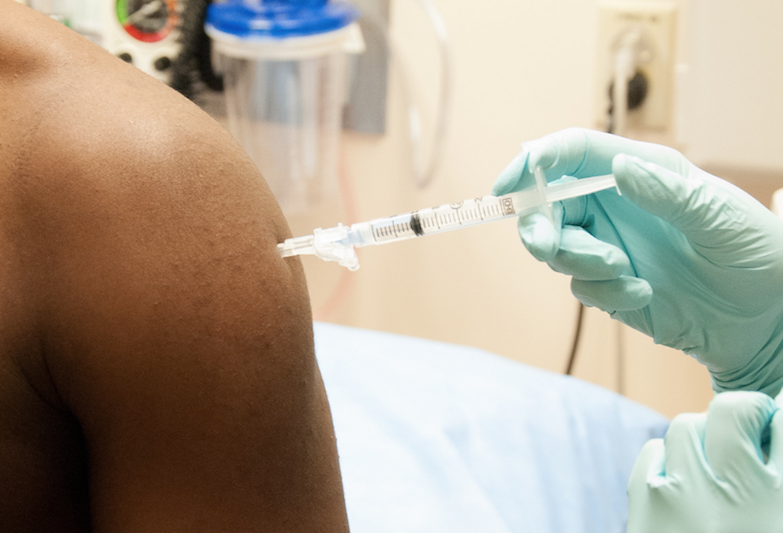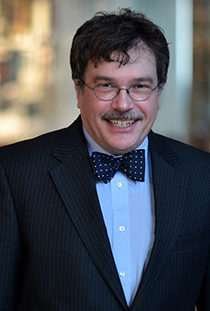Fighting ‘Anti-Science’ in the Face of a Measles Outbreak
By Reid Jowers
Reporting Texas

A child receives a vaccination. Photo courtesy of National Institutes of Health.
America is experiencing its worst measles outbreak since 2000, almost 880 cases reported in 24 states. In Texas, public health officials have tracked 15 cases in 11 counties, mostly in the vicinities of Dallas and Harris counties. Dr. Peter Hotez, professor of pediatrics and dean of the National School of Tropical Medicine at Baylor School of Medicine, and an expert on vaccines, has been an outspoken critic of the anti-vaxxer movement, citing its outsized social and political clout for contributing to measles’ comeback. Hotez has garnered attention among his scientific colleagues for, among other things, correctly predicting measles would recur in 2018, in a 2016 article in the journal PLOS Medicine. Hotez spoke with Reporting Texas about the latest outbreak and the prevalence of the disease going forward. Herewith, excerpts:
On the severity of the current outbreak:
Things could get substantially worse, but on the other hand it might not. When the U.S. had measles in the pre-vaccine era, it tended to peak in the springtime, then as it moved into the warmer summer months it declined. We’ll have to see which force becomes more dominant [the traditional decline] … or continued [higher levels from]European travels, especially [to] Italy and France, where most of the measles outbreaks in the U.S. originate from.

Dr. Peter Hotez. Photo courtesy of Baylor College of Medicine.
On the countering the anti-vaxxer movement:
I’ve identified a three-part solution to ensuring measles will not return. The first is to recognize the anti-vaccine movement has transitioned from a fringe group into its own media empire. There are an estimated 500 anti-vaccine websites, amplified on Facebook. Amazon has become the biggest promoter of anti-vaccine books. We need to work with the leaders of commerce and social media platforms to stop them from promoting … misinformation. The second step is to dismantle the political arm of the movement. There are political action committees in multiple states that lobby legislatures to exempt kids from vaccines. One of the most powerful… is Texans for Vaccine Choice. The third piece is [pro-vaccine advocacy] from federal agencies. The lack of these three steps has created the perfect storm we have now.
On anti-vaxxer claims:
Their major argument is vaccines cause autism. I’m a vaccine scientist, but I’m also the parent of a daughter with autism, and I wrote a book [“Vaccines Did Not Cause Rachel’s Autism: My Journey As a Vaccine Scientist, Pediatrician, and Autism Dad”] that does a deep dive on … how there is absolutely no link between vaccines and autism and how autism actually begins.
On his celebrity status in the world of science:
It’s not in the DNA of physicians to be out there advocating for something like vaccines. But I saw this as a public health crisis and we could have measles outbreaks soon, and sure enough we have a mess now. Even in spite of that, there’s still few of us willing to stand up and defend vaccines. So I push back about the way we usually think about physicians and say we need to be out there and engaging because otherwise anti-science movements will continue to flourish.
On a doctor’s passion for vaccines:
I’ve been doing this for the last 40 years … I think vaccines are an example of how you can use science to achieve humanitarian goals. There is no greater impact that can relieve pain and suffering, especially for children, than vaccines. They’re our greatest public health triumph.
On the Travis County’s absence of measles cases, so far:
Travis so far has dodged a bullet, but it’s only going to be a matter of time because Travis county unfortunately has some of the worst percentages of unvaccinated kids in the country. There is anywhere from 10 to 30 percent of kids in every school unvaccinated …. Unfortunately, the anti-vaccine movement has become the new normal, and until we take … steps to dismantle the movement, this will continue to plague us.